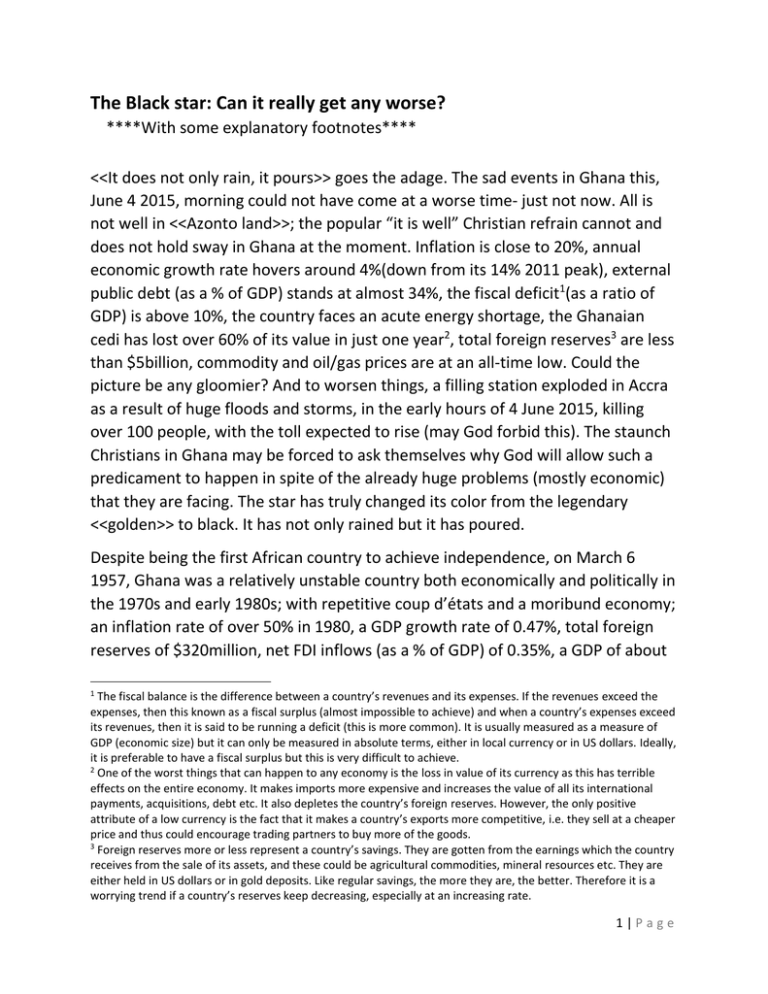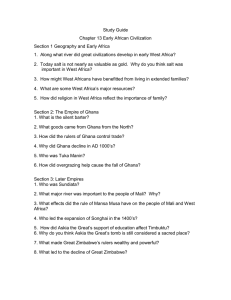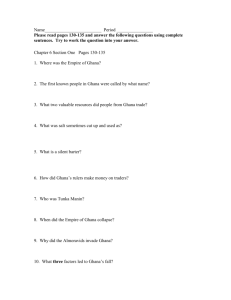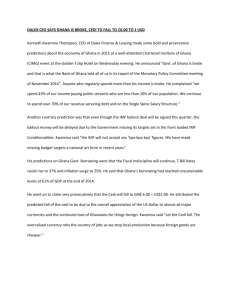The Black star - WordPress.com
advertisement

The Black star: Can it really get any worse? ****With some explanatory footnotes**** <<It does not only rain, it pours>> goes the adage. The sad events in Ghana this, June 4 2015, morning could not have come at a worse time- just not now. All is not well in <<Azonto land>>; the popular “it is well” Christian refrain cannot and does not hold sway in Ghana at the moment. Inflation is close to 20%, annual economic growth rate hovers around 4%(down from its 14% 2011 peak), external public debt (as a % of GDP) stands at almost 34%, the fiscal deficit1(as a ratio of GDP) is above 10%, the country faces an acute energy shortage, the Ghanaian cedi has lost over 60% of its value in just one year2, total foreign reserves3 are less than $5billion, commodity and oil/gas prices are at an all-time low. Could the picture be any gloomier? And to worsen things, a filling station exploded in Accra as a result of huge floods and storms, in the early hours of 4 June 2015, killing over 100 people, with the toll expected to rise (may God forbid this). The staunch Christians in Ghana may be forced to ask themselves why God will allow such a predicament to happen in spite of the already huge problems (mostly economic) that they are facing. The star has truly changed its color from the legendary <<golden>> to black. It has not only rained but it has poured. Despite being the first African country to achieve independence, on March 6 1957, Ghana was a relatively unstable country both economically and politically in the 1970s and early 1980s; with repetitive coup d’états and a moribund economy; an inflation rate of over 50% in 1980, a GDP growth rate of 0.47%, total foreign reserves of $320million, net FDI inflows (as a % of GDP) of 0.35%, a GDP of about 1 The fiscal balance is the difference between a country’s revenues and its expenses. If the revenues exceed the expenses, then this known as a fiscal surplus (almost impossible to achieve) and when a country’s expenses exceed its revenues, then it is said to be running a deficit (this is more common). It is usually measured as a measure of GDP (economic size) but it can only be measured in absolute terms, either in local currency or in US dollars. Ideally, it is preferable to have a fiscal surplus but this is very difficult to achieve. 2 One of the worst things that can happen to any economy is the loss in value of its currency as this has terrible effects on the entire economy. It makes imports more expensive and increases the value of all its international payments, acquisitions, debt etc. It also depletes the country’s foreign reserves. However, the only positive attribute of a low currency is the fact that it makes a country’s exports more competitive, i.e. they sell at a cheaper price and thus could encourage trading partners to buy more of the goods. 3 Foreign reserves more or less represent a country’s savings. They are gotten from the earnings which the country receives from the sale of its assets, and these could be agricultural commodities, mineral resources etc. They are either held in US dollars or in gold deposits. Like regular savings, the more they are, the better. Therefore it is a worrying trend if a country’s reserves keep decreasing, especially at an increasing rate. 1|Page $4billion, amongst other statistics. As at 2014, total foreign reserves are over $4billion (over 10 times their 1980 levels), the country’s economic size (GDP) stands at about $40billion (again over 10 times its 1980 level), the consumer price index (inflation)4 averages about 15%(less than a third of the rate in 1980), the annual economic growth rate is about 4%(10 times the 1980 levels). By all standards therefore, in spite of the present slew of problems, Ghana has done well. If the economic and social progress made in Ghana in the last three decades were a PhD defense/viva voce (souténance in French), the country will have logically received a <<mention très honorable>> after the jury’s deliberations. However, in spite of the <<mention très honorable>> for the past three decades, a subtle look at the country key statistics over the past 5-7 years gives a slightly different picture. Worthy of mention here is the fact that present opposition party, the National Patriotic Party (the NPP), was in power with John Agyekum Kuffuor as President from 2000-2008. Ghana was seen at this period as one of the most democratic nations in Africa. The country received accolades from all over the world because of its <<complete turnaround>> from the political instability in the 1980s even though the economy was still picking up from its erstwhile reels. The economy expanded from 2000 to 2008(from $4.9billion to $28.5billion) with an annual growth rate increase from 3.7% to 8.4%, total reserves also increased more than 6 times (from $308.9million in 2000 to $1.9billion in 2008), external debt5 fell from $4.9billion to $3.9billion. This period also saw Ghana issue its first $750million 10 year Eurobond6 on September 27 2007, one year after Seychelles 4 A country’s inflation rate, a sort of measure of the general price level of goods and services, is a gauge for its overall macroeconomic stability. The lower the inflation rate the better. However, this rate is dependent on so many other factors, such as i) the Central Bank’s monetary policy; whether they are increasing the amount of money in the economy(expansionary policy) or they are rather reducing the supply(contractionary policy), ii)the country’s level of industrialization, as this will determine whether it imports more than its exports or vice versa. A country that imports more than its exports is likely to have very high prices for its goods and services, and this is the case with most African nations, including Ghana. An expansionary monetary policy, all conditions held constant, increases a country’s general price levels meanwhile a contractionary policy does the opposite, ceteris paribus. 5 Like personal debt, the smaller the value of external debt the better, both in absolute terms and as a ratio of another major variable (usually GDP but this could also be total government revenues). So it is good news if the values of a country’s external debt are falling. 6 A Eurobond is a bond (debt obligation) issued by a country/company/institution in international financial markets (London, New York, Tokyo, Hong Kong) in a currency other than its own local currency. For example in the case of the government of Ghana whose local currency is the Ghanaian cedi, if it issues a bond in say Hong Kong in US dollars, or in Japanese yen, this is a Eurobond. Also, a Mauritanian company could issue a bond in New York in US dollars- this is also a Eurobond. The issue currency must not be in Euros. Issuing a Eurobond is referred to in 2|Page became the first Sub-Saharan African country (ex-South Africa) to issue a Eurobond. Then on 3 July 2008, the Government of Ghana sold its 70% stake in Ghana Telecom for a whopping $900million. All was therefore set and <<ready>> for Ghana to become a major player in Africa’s (socio-) economic landscape. The December 2008 elections were narrowly won by John Evans Atta Mills (now baetae memoriae) under the National Democratic Congress (NDC) ticket over Nana Addo Dankwa Akufo-Addo, the NPP candidate. It is important to state that whilst the NPP is right-wing in its policies, the NDC is more or less left-wing, at least on paper… John Evans Atta Mills was inaugurated on 7 January 2009 but died on 24 July 2012, just a few months to the end of his first term-in December 2012. He was replaced, according to the Constitution, by his Vice President, John Dramani Mahama who was the NDC’s flagbearer in the Presidential elections and again narrowly won Akufo-Addo. The country’s economic picture during Atta Mills’ (first and only) term was mixed-total foreign reserves, net Foreign Direct Investments (FDI) and GDP rose, the country became a <<small>> oil producer in 20107, the same year in which it rebased its economy (an exercise that made Nigeria became Africa’s biggest economy in April 2014), and its economic output increased by 62% to about $32billion. However, in spite of the <<stellar statistics>>, the economy’s debt8(Central government, external, domestic, public, private) exploded, both in absolute terms and as a ratio of GDP. Things were heading <<South>>…. Every economic and perhaps social statistic has headed in the <<bad direction>> since 2012; the cedi has lost more than half its value, inflation and debt have gotten to an all-time high, reserves have dropped precipitously, budget and trade deficits have widened, electricity supply has taken a dip, agricultural outputs have reduced, the costs of imports have risen, commodity prices have dropped etc etc etc etc. In short, all is not well. For the first time after so many years, the finance as “original sin”. Countries/companies resort to issuing Eurobonds when they intend to raise considerable amounts and this can only be done in the international capital markets, which are very liquid. 7 Becoming an oil producer in the era of >$100 a barrel was big news for any economy. Even if the country produced just 100 000 barrels a day, this meant minimum revenue inflows of $10, 000 000 a day… almost “all of a sudden”/”from nowhere”. 8 There are several variants of debt for a country- external, central government, private, domestic-whose names are self-explanatory. For all and any of them, the smaller the values, both in absolute terms and as a ratio of GDP, the better for any economy. 3|Page Government of Ghana made a request for financial assistance from the International Monetary Fund (IMF) and on April 3 2015, the Fund’s Board approved a $918billion Emergency Credit Facility (ECF)9. And to add pain to injury, an explosion at a petrol filling station killed 100people, most of whom were taking shade from the heavy rain storms, in the early hours of 4 June 2015. Whilst some of the economy’s woes are <<imported>>, i.e. are out of the government’s control, as is the case with the prices of commodities and agricultural products, the present NDC government cannot and should not be exonerated. Most likely, if the economy was rather going <<North>> postKufuor’s presidency, the NDC would have claimed <<ownership>> of the success. It is fair to assert, therefore, that the NPP is a/the better party to govern Ghana than the left-wing NDC. But hey- these are just the thoughts and reflections of an ordinary African fellow… 9 This is a credit facility/loan given by the IMF to countries that are in serious economic difficulties, as is Ghana at the moment. Countries that are offered these loans are required to enact some somewhat stringent reforms to bring their “economic house back in order”. These reforms will usually comprise reducing the size of the public sector and wage bill, cutting or eliminating fuel subsidies, improving the business climate, improving the efficiency of the tax system, amongst others. Portugal, Greece and Mali are examples of countries presently under such IMF programs. 4|Page






